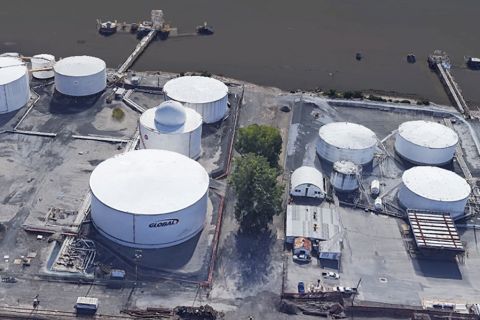Alberta Premier Rachel Notley warned Canadian senators on Feb. 28 that a slump in the country's energy sector could deepen if the federal government passes proposed legislation to change how major projects like pipelines are assessed.
Notley appeared before a Senate committee considering Bill C-69, aimed at revamping Canada's major project environmental assessment process.
Proponents say the bill will streamline the approval process and rebuild public trust, while critics predict it will create new uncertainty, deterring investment in the oil sector.
Canada produces some 4.9 million barrels per day of oil, making it the world's No. 4 producer. But rising output has outstripped new pipeline capacity, leading to a buildup in storage, which last year sent the price of Canadian crudes tumbling.
Alberta, Canada's main oil-producing province, estimates that the bottlenecks cost the Canadian economy some C$80 million ($60.8 million) per day.
The land-locked province is desperate for new oil export pipelines, but regulatory and legal hurdles have delayed projects like an expansion of the Trans Mountain line to the Pacific Coast.
"We agree that the process for approving infrastructure projects needs to change," Notley told the Senate Committee on Energy, Environment and Natural Resources. "But we cannot swap one broken system with another broken system."
Prime Minister Justin Trudeau's Liberal government unveiled the draft of Bill C-69 last year. Supporters say the changes will improve the consultation process with indigenous people, thereby reducing hurdles that have crippled oil pipeline construction in recent years and other major projects.
Critics say it will give too much power to government, allowing ministers to veto projects before a review even begins, and create far more uncertainty for investors.
Notley suggested a number of amendments to the bill, such as providing more clarity on exactly what factors will be considered when assessing a new project and excluding projects already reviewed at the provincial level.
"We do not want to have needless duplication of efforts on projects that are squarely within provincial jurisdiction," Notley told reporters after her testimony.
She also asked for firm time limits for project assessments and for the federal government to consider the socio-economic impacts of a project in its evaluation process.
The bill is before the Senate committee, which can offer amendments based on testimony by experts and affected individuals. It still faces a number of additional steps before it becomes law.
Recommended Reading
Mexico Pacific Appoints New CEO Bairstow
2024-04-15 - Sarah Bairstow joined Mexico Pacific Ltd. in 2019 and is assuming the CEO role following Ivan Van der Walt’s resignation.
Global Partners Declares Cash Distribution for Series B Preferred Units
2024-04-15 - Global Partners LP announced a quarterly cash dividend on its 9.5% fixed-rate Series B preferred units
W&T Offshore Adds John D. Buchanan to Board
2024-04-12 - W&T Offshore’s appointment of John D. Buchanan brings the number of company directors to six.
73-year Wildcatter Herbert Hunt, 95, Passes Away
2024-04-12 - Industry leader Herbert Hunt was instrumental in dual-lateral development, opening the North Sea to oil and gas development and discovering Libya’s Sarir Field.
Riley Permian Announces Quarterly Dividend
2024-04-11 - Riley Exploration Permian’s dividend is payable May 9 to stockholders of record by April 25.





